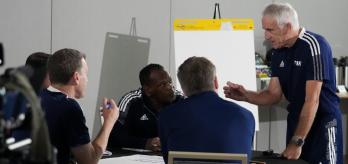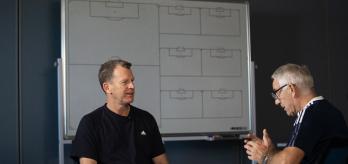As with previous sessions, Giovani grounds his teaching in a structured learning framework to ensure targeted and effective instruction. As a reminder, the LEARNS framework stands for:
-
Learner-centred
-
Environment
-
Actively involved
-
Reflect
-
New information
-
Stretch
Giovani structures his session around the LEARNS framework, and actively applies the ‘New Information’ pillar to encourage student coaches to reflect on their learning and consider how to apply it in future practice.
Introduction and quick-fire quiz
Giovani opens the session by stating the two learning outcomes:
-
Deepening student coaches’ understanding of the Analytical and Global coaching methods
-
Identifying the strengths and limitations of each
After the introduction, the coach educator engages the class with a quick-fire quiz, prompting student coaches to activate prior knowledge and make connections to the new material.
Group-based competition
Next, Giovani divides the class into two groups, assigning each to list the advantages and disadvantages of a coaching method. Teams compete for points, reinforcing knowledge through collaboration and discussion. This approach (group collaboration) promotes peer learning, increases knowledge, and strengthens each individual’s understanding through group dialogue.
Presenting findings and concluding presentation
Once the groups compile their points, they present their findings to each other. Giovani encourages critical discussion, prompting student coaches to question and evaluate each method. Finally, the coach educator summarises the findings and introduces new information, guiding student coaches to apply these insights in designing future practices.
Session summary
As a coach educator, consider the following take-aways:
-
Collaborative learning enhances knowledge and understanding – Group activities can help student coaches deepen understanding through peer interaction and discussion.
-
Frameworks guide teaching – The LEARNS framework ensures clear outcomes and effective integration of new information.
-
Reflection supports application – Presenting and critically discussing findings links theory to practice design.











